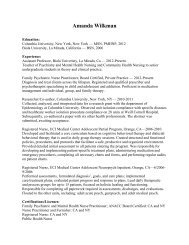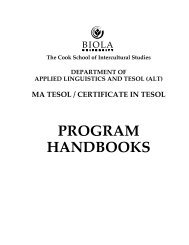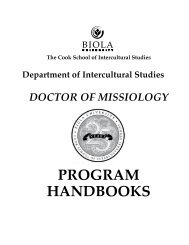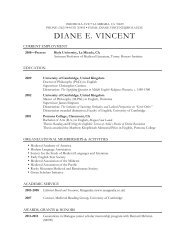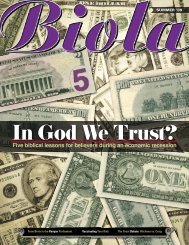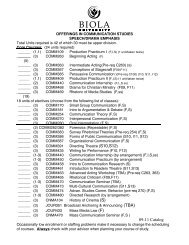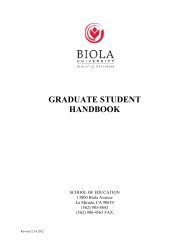Dawkins' God Delusion Divorced American ... - Biola University
Dawkins' God Delusion Divorced American ... - Biola University
Dawkins' God Delusion Divorced American ... - Biola University
Create successful ePaper yourself
Turn your PDF publications into a flip-book with our unique Google optimized e-Paper software.
24 CONTINUING ED BIOLA CONNECTIONS ❁ SPRING ’07<br />
How Can Math Reveal the Wonders of <strong>God</strong>?<br />
Is 91 a prime number? The question alone<br />
is enough to make some people’s eyes<br />
glaze over. You may be thinking, “Math<br />
was never my thing.”<br />
But wait. Before you stop reading, let’s look<br />
more closely and leave any bad memories that<br />
some might have of math classes behind.<br />
Mathematics — like all disciplines of study —<br />
reveals the wonders of <strong>God</strong>.<br />
Of course, we could ask how Beethoven’s<br />
Ninth Symphony relates to <strong>God</strong> or how the<br />
ceiling of the Sistine Chapel relates to <strong>God</strong>. A<br />
musician might answer indignantly that<br />
Beethoven’s music lifts one into the heavenly<br />
realms, and an artist could say that<br />
Michelangelo’s painting of the finger of <strong>God</strong><br />
almost touching the finger of Adam points to the<br />
relationship between <strong>God</strong> and man. The feelings<br />
that come from hearing and seeing these great<br />
works of art can leave one speechless — even<br />
sensing the presence of <strong>God</strong>.<br />
We will attempt to show that, believe it or<br />
not, the surprising and unexpected properties of<br />
prime numbers can leave one marveling at the<br />
wonders of <strong>God</strong>’s creation and produce in one a<br />
feeling of reverence for our Creator.<br />
Of course, we first need to know that a<br />
prime number is a number greater than 1 that<br />
can be divided only by itself and the number 1<br />
without yielding a remainder. Since 7 and 13<br />
divide 91 without yielding a remainder in<br />
addition to itself and 1, this answers my first<br />
question. 91 is not a prime number. Here are the<br />
first 25 prime numbers:<br />
2, 3, 5, 7, 11, 13, 17, 19, 23, 29, 31, 37, 41, 43,<br />
47, 53, 59, 61, 67, 71, 73, 79, 83, 89, 97.<br />
There are, in fact, an infinite number of<br />
prime numbers. If you are good at math, this is<br />
all wrapped up in the expression n! + 1, but we<br />
need not elaborate on that. Now for some<br />
amazement.<br />
Even though there are an infinite number of<br />
prime numbers, if you pick any large number, say<br />
1 trillion, there are stretches of 1 trillion<br />
consecutive numbers (that is, one number after<br />
another) where no prime number occurs. And if<br />
you multiplied 1 trillion by itself 1 trillion times (a<br />
number so large we could never hope to write it<br />
down), there are stretches of consecutive<br />
numbers that long where no prime number<br />
occurs. So, the question is how can there be an<br />
infinite number of prime numbers when one can<br />
find a stretch of consecutive numbers as long as<br />
you would like where no prime number occurs?<br />
But there’s something even more surprising<br />
about prime numbers. If you add up their<br />
reciprocals, you will find that the sum is infinite.<br />
What I mean by this is that if you add 1/2 + 1/3 +<br />
1/5 + 1/7 + 1/11 + 1/13 + 1/17 + 1/19 + . . . and keep<br />
going through all the prime numbers, the sum<br />
will approach infinity — even though the<br />
numbers you are adding are getting smaller and<br />
smaller, and there are arbitrarily long stretches<br />
of numbers where no prime number occurs.<br />
So, if we pick a number like 1 trillion, this<br />
sum will eventually exceed 1 trillion as we keep<br />
adding on reciprocals of primes. This is particularly<br />
surprising given that the sum is little<br />
more than 3 after using the first 5 million<br />
prime numbers!<br />
So often we put <strong>God</strong> in a box. But, as we look<br />
at prime numbers, we realize that the unexpected<br />
surprises He has for us are amazing. This<br />
increases our awe of Him in worship.<br />
Just as Beethoven’s Ninth Symphony and<br />
Michelangelo’s painting on the ceiling of the<br />
Sistine Chapel point to the glory of <strong>God</strong>, so do<br />
the amazing properties of mathematics. There is<br />
wonder in the universe that <strong>God</strong> has created that<br />
can be found in all areas of study, even math!<br />
Ed Thurber, Ph.D.,<br />
has served as a professor of mathematics<br />
at <strong>Biola</strong> <strong>University</strong> since 1970. He has a<br />
doctorate in mathematics from the<br />
<strong>University</strong> of Southern California.



